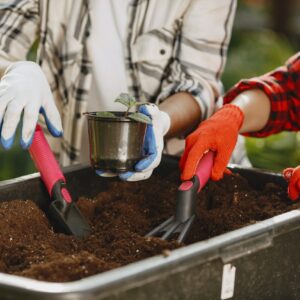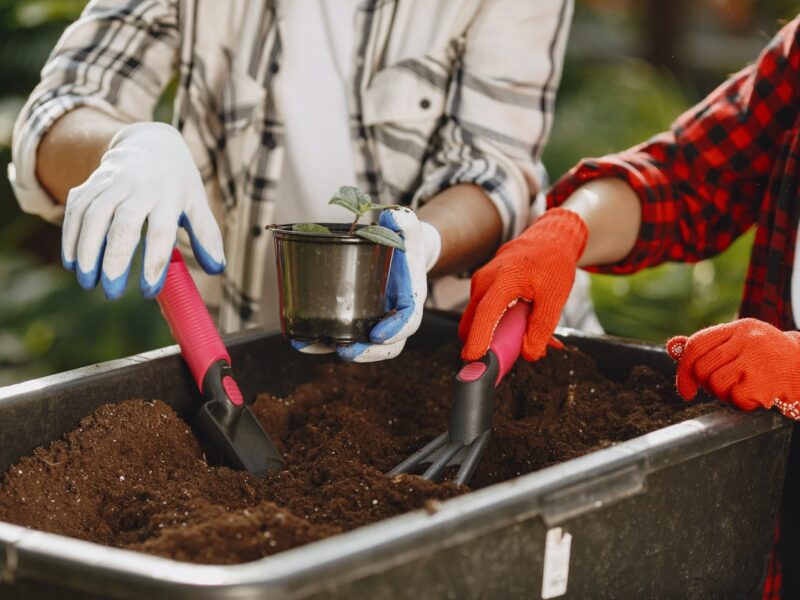How to Use Coffee Grounds in Your Garden
Eating homegrown vegetables is a rewarding experience. You may want your next garden to grow more veggies, and with coffee grounds, you also benefit flowers and other plants. No matter what you decide to grow in your garden, these tips will provide extra nourishment and balance the soil chemistry without requiring store-bought fertilizer. This guide will show you how to use coffee grounds in gardening so you can harvest the best vegetables in the neighborhood, let’s dig into it!
1. Let Them Dry
After you finish your next cup of coffee, gather the used grounds and spread them out to dry. They’ll dry quickly on parchment paper or over your yard, if the soil isn’t wet from dew or previous rainstorms. The key is to spread it into one thin layer so nothing clumps or piles up, which would prevent it from drying completely.
Once combined with your garden’s soil, the grounds will absorb extra water. It’s perfect for gardens that struggle with drainage or deal with consistent rainy weather. One gram of coffee grounds soaks up 16 grams of water, preventing plant diseases that result from soggy soil.

2. Mix Them With Mulch
Mulch layers protect soil from direct sunshine, slowing evaporation so your garden can soak as long as it needs. Mix your dry coffee grounds with mulch for extra protection. They’ll hold onto any water your plants need during periods of hot weather while the mulch shelters them from sunlight.

3. Combine Them With Compost
Many gardeners make fertilizer by composting. Although your bin might start with kitchen waste and newspaper, you can also reuse coffee grounds in compost bins and add extra organic material. The grounds create a great balance for your compost — they can absorb heavy metals in existing soil on top of providing essential materials to growing plants.
At the same time, it’s crucial not to add too much coffee grounds and nitrogen to your soil. The roots may stop growing because they don’t need to search for nutrients anymore. Visit your local state-sponsored soil testing lab for an in-depth look at just how much nitrogen your garden needs.
4. Add Them to Nitrogen Fertilizer
If your soil test registers a meager amount of nitrogen, add coffee grounds to store-bought fertilizer. They will feed the microorganisms around the roots and make the soil more robust, while the fertilizer supplies nitrogen just for your garden. This is a quick fix for depleted soil and shouldn’t be a long-term gardening strategy.
Some plants won’t excel in nitrogen-rich soil. Sweet potatoes, for example, will produce stunted tubes if there is a strong imbalance. Carefully research your favorite plants to determine where this fertilizer is best used.

5. Compost Your Coffee Filters
Anyone who uses a traditional coffee maker that requires filters can add those to their compost bin, too. As long as they’re paper and are biodegradable, they’ll become a fresh carbon source, balancing the nitrogen from coffee grounds.
Gardeners who want to grow organic veggies should note that some companies bleach and treat their paper filters with chemicals. Look for all-natural or unbleached filters if you don’t want these additives in your soil.
6. Save Grounds in Trash Containers
Dry coffee grounds are a long-lasting resource. They’ll aid your garden now and store well in large, air-sealed trash containers or Tupperware. The nutrient content keeps for months and even years if protected by moisture.
After your soil balances out, save your coffee grounds and reuse them when needed again. It’s a free fertilizer that could help your garden later on without costing a dime.
7. How to Use Coffee Grounds in Your soil
Now that you know how to use coffee grounds in gardening, perform soil tests regularly. You’ll discover exactly what your garden needs and have a nitrogen source standing by to help. As long as you’re careful not to mix coffee grounds with your soil too often, your plants will thrive with this basic resource.

GARDENIZE GARDEN APP
YOUR GARDEN FRIEND WITH GREEN FINGERS AND PHOTOGRAPHIC MEMORY.
Gardenize is an app for gardening and cultivation that helps you to overview, understand and develop your garden and your crops. Organizing your garden makes it easier to succeed and your Gardenize app structures all information and make it searchable. You can download the app from the App Store or Google Play, or create an account directly in the web app in your browser. Welcome to the gardening community in Gardenize!
More from Gardenize
Images published on the Gardenize website belong to Gardenize AB and may not be used without permission.





